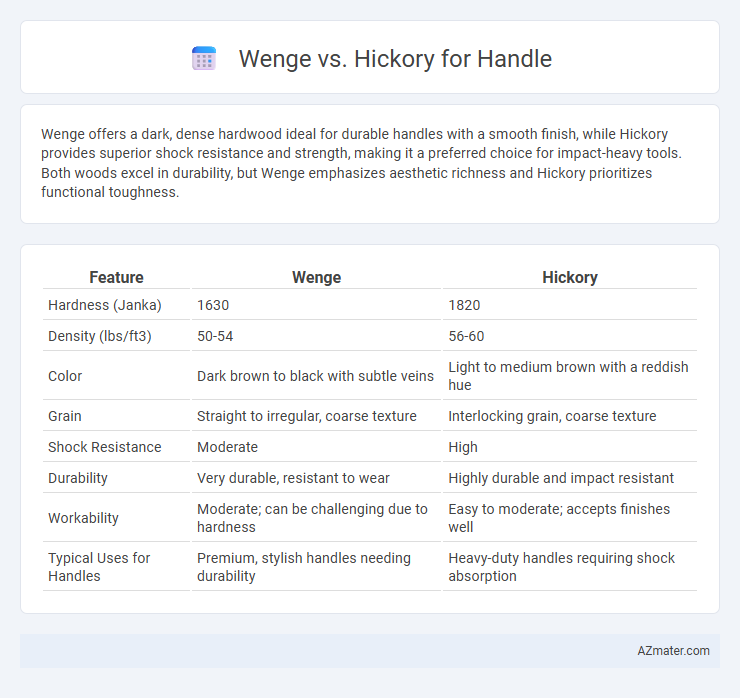Wenge offers a dark, dense hardwood ideal for durable handles with a smooth finish, while Hickory provides superior shock resistance and strength, making it a preferred choice for impact-heavy tools. Both woods excel in durability, but Wenge emphasizes aesthetic richness and Hickory prioritizes functional toughness.
Table of Comparison
| Feature | Wenge | Hickory |
|---|---|---|
| Hardness (Janka) | 1630 | 1820 |
| Density (lbs/ft3) | 50-54 | 56-60 |
| Color | Dark brown to black with subtle veins | Light to medium brown with a reddish hue |
| Grain | Straight to irregular, coarse texture | Interlocking grain, coarse texture |
| Shock Resistance | Moderate | High |
| Durability | Very durable, resistant to wear | Highly durable and impact resistant |
| Workability | Moderate; can be challenging due to hardness | Easy to moderate; accepts finishes well |
| Typical Uses for Handles | Premium, stylish handles needing durability | Heavy-duty handles requiring shock absorption |
Introduction: Wenge vs Hickory Handle Materials
Wenge and Hickory are popular handle materials valued for their durability and unique aesthetics. Wenge offers a dense, dark brown hardwood with distinct black streaks, providing a luxurious, exotic look and high resistance to wear. Hickory, known for its light color and exceptional toughness, delivers superior shock absorption and grip, making it ideal for heavy-use tool handles.
Overview of Wenge Wood
Wenge wood is a dense, dark hardwood native to Central Africa, prized for its rich chocolate-brown color and striking grain patterns. It offers exceptional durability and a smooth, tactile finish, making it ideal for tool handles that require both strength and a comfortable grip. Compared to hickory, wenge provides a more aesthetic, exotic look with comparable hardness and resistance to wear, enhancing both functionality and visual appeal in handle applications.
Overview of Hickory Wood
Hickory wood is renowned for its exceptional strength, shock resistance, and durability, making it a preferred choice for tool handles and sports equipment. Its dense grain structure provides superior grip and impact absorption compared to Wenge, which, while visually striking, is more brittle. Hickory's natural resilience and ability to withstand heavy use contribute to its widespread use in demanding applications requiring reliable performance.
Durability Comparison: Wenge and Hickory
Wenge and Hickory are both prized for their exceptional durability in handle applications, with Hickory known for its superior shock resistance and impact strength, making it ideal for high-stress tools. Wenge offers excellent hardness and wear resistance, providing a smooth yet robust grip that withstands heavy use without significant wear. While Hickory slightly outperforms Wenge in mechanical toughness, Wenge's dense and stable nature ensures long-lasting performance in precision handles.
Appearance and Aesthetic Differences
Wenge handles exhibit a deep, rich chocolate-brown color with striking black streaks, lending a luxurious and exotic appearance ideal for high-end furniture and tools. Hickory handles feature a lighter, creamy beige to reddish-brown tone with a straight grain and subtle texture, providing a classic and rustic aesthetic that ages gracefully with use. The stark contrast between Wenge's dark, bold pattern and Hickory's warm, understated look offers distinct visual choices depending on design preference.
Weight and Balance Factors
Wenge handles offer a dense, heavy feel with a specific gravity of around 0.85, providing substantial weight that enhances balance for knives requiring solid heft. Hickory, with a lower specific gravity near 0.70, is lighter and contributes to more agile, well-balanced tools suitable for prolonged use. The choice between Wenge and Hickory for handles hinges on the desired weight distribution and ergonomic balance, where Wenge favors stability and Hickory prioritizes maneuverability.
Grip Comfort and Ergonomics
Wenge offers a dense, fine-grained texture that provides excellent grip comfort and reduces hand fatigue, making it ideal for ergonomic handles. Hickory's slightly softer, more fibrous structure absorbs shock effectively, enhancing overall grip stability during prolonged use. Both woods are durable, but Wenge's natural oiliness adds a smooth yet secure feel, while Hickory's resilience supports ergonomic designs requiring flexibility and impact resistance.
Resistance to Moisture and Wear
Wenge handles offer superior resistance to moisture due to their dense hardwood fibers and natural oils, which help prevent swelling and damage in humid conditions. Hickory, while exceptionally tough and wear-resistant, tends to absorb more moisture, making it more susceptible to warping over time. For handles exposed to frequent moisture and heavy wear, Wenge provides enhanced durability and longevity.
Cost and Availability
Wenge hardwood handles generally cost more due to their rarity and exotic status, while hickory handles are more affordable and widely available in North American markets. Hickory's abundant supply and consistent quality make it favored for budget-friendly, durable handles. Wenge, valued for its distinctive dark grain and density, may require special sourcing, leading to higher prices and limited availability.
Choosing the Right Wood: Wenge or Hickory
Wenge offers a rich, dark color and dense hardness that provides exceptional durability and a smooth finish for handles, making it ideal for premium, stylish applications. Hickory, known for its strong shock resistance and lighter, golden-brown appearance, excels in durability and grip, especially suited for tools and handles requiring toughness and resilience. Choosing between Wenge and Hickory depends on the balance of aesthetic preference versus functional durability, with Wenge favored for high-end elegance and Hickory prized for rugged, practical use.

Infographic: Wenge vs Hickory for Handle
 azmater.com
azmater.com